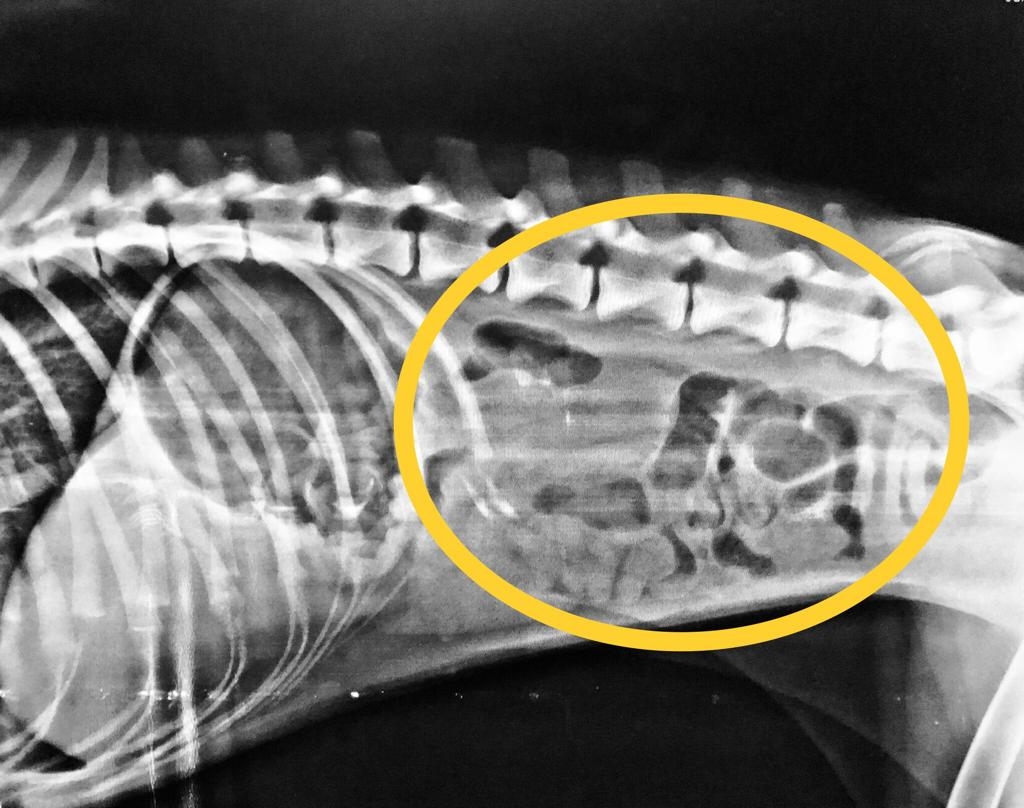Why is Gastritis a common and recurring problem in Pets?
Have you ever wondered why dogs or cats sometimes tend to eat leaves, grasses, soil or things other than food and vomit the same with extra froth and water? You would have seen this happening nearby their kennels, doorstep or garden. The reason is your dog must be suffering from gastritis or severe abdominal discomfort. It could also be due to some mineral deficiencies too. Most of the time it is due to the abdominal discomfort.

Gastritis is one of the most common conditions that we come across in a vet clinic. It is a general term used when there is inflammation of the mucosa /inner lining of the stomach. It can be accompanied by vomiting, reduced appetite or reluctance to take food. Dogs which are fed with home-made diet are more prone to this condition. This is mainly because of the unfamiliarity in the field of dog nutrition, liberal use of spices, salt, sugar etc. Dog of any breed of any age or size are susceptible to this condition but breeds like Basenji, Norwegian lunderhund are found to be more prone.
What is gastritis?
Technically speaking it is a syndrome in which there is chronic (long standing) or acute (sudden) vomiting in addition to the inflammation of the gastric mucosa. In simple words, any substances which causes irritation, infection or any injury to the gastric mucosa will activate the inflammatory mediators. This is substance which reach a site when there is any injury or irritation as a defence mechanism of the body. This can lead to the erosion and disruption of the epithelial cells of the stomach, increased gastric secretion (acid release from cells) and impaired function. Visceral receptors (receptors inside the stomach) sense the changes like distention, gas accumulation, increased acid secretions in the stomach and send impulses to the vomiting centre (Medulla Oblongata) of the brain thereby stimulating the vomiting reflex. The body is clever enough to recognise there is something irritating in the stomach and gets rid of it by sending the signals to the brain so that brain can activate the vomiting centre and eliminate it from the body.
There are basically two types of gastritis. Acute and chronic gastritis.
Acute gastritis
A condition is called acute gastritis when there is sudden onset of vomiting and other gastric irritation. It can be preceded by ingestion as a result of taking spoiled food, contaminated food, chemicals, metals, foreign materials, toxic plants, antibiotics, certain medications etc. certain viral and bacterial diseases can also cause gastritis. Vomitus can contain froth, mucus, bile, food materials or even blood.
Chronic gastritis
When there is intermittent or persistent vomiting which lasts for more than 7 days it can be called as chronic gastritis. It occurs mainly due to the systemic infection, endoparasitism (parasites in the stomach or intestines) or any kind of long standing conditions.
What can cause Gastritis in Dogs?
• Feeding of contaminated or spoiled food (mouldy food, decomposed food, household garbage, sewage water or food materials, rancid milk etc.)
• Ingestion of foreign materials (sharp bones, toys, thread, objects made of rubber, coins, keys etc.)
• Ingestion of toxic or poisonous plants
• Ingestion of too cold or too hot food
• Ingestion of chemical substances like detergents, toilet cleaners and other disinfectants
• Strong acid or alkali
• Herbicide, rodenticide and fertilizers
• Drugs like aspirin, phenylbutazone, chloral hydrate, steroids, antibiotics
• Food allergy or food sensitivity
Does your dog have a Gastritis disorder?
The following are the symptoms of Gastritis
Check if your dog is
• Dull and inactive
• Severe discomfort and abdominal pain
• Nausea and vomiting
• Poor appetite or perverted appetite (eating of non-edible substances like grass, coconut husk, soil, objects which are made out of clay)
• Undigested or decomposed food expelled through vomitus; colour can be green, yellowish, red or greyish depending upon the content of the vomitus
• Offensive odour from the mouth, tongue coated with dirty material
• Increased thirst
• Tendency to lie down keeping the abdomen in apposition with the cool surfaces
• May lie in crouching posture, typical praying posture is also noticed where the hindquarters are raised and chest and forelegs close to the surface or floor? This is mainly due to the abdominal pain.

• On palpation of the abdomen, severe pain and discomfort experienced
What you should do if you find Gastritis symptoms in your dog?
These above mentioned symptoms can go unnoticed or overlooked at times. Careful observation is required for the early detection of this condition. Self-medication is strictly a NO NO! Never give human medications to your pets unless it is recommended. As a responsible pet owner one thing that can be done is immediately on noticing any of these signs of gastritis contact your vet. Earlier the better so that less complicated the condition will be.
Here I would like to emphasise more on your appointment with the veterinarian. Most of the time we may think it is a simple indigestion or a gastritis and try out some YouTube hack’s or recipes. I am not arriving to a conclusion that it will not work. It may work but not all the time. Gastritis is just a symptom it is not a disease therefore the root cause of your pet’s abdominal discomfort may be due to some other underlying conditions. It is always better to rule out the other possibilities like obstruction, hernia, tumour, intussusception, kidney failure etc. After ruling out these possibilities we are good to try our natural remedies.
Recommended remedies for Gastritis
• Gastrointestinal rest is important therefore, food should be withheld for 12-24hrs
• Bland food and soup should be offered at 4 hours interval
• Allow them to lick ice block/cold water in small quantities
• To neutralize acid, antacids of your veterinarian’s choice can be given before meal.
• Tender coconut water is rich in electrolytes – good choice to replace the electrolytes which are lost through vomiting.
• To correct dehydration you might have to take your dog to hospital and give dextrose saline and ringer’s solution in case of severe dehydration. If there is no much dehydration or if the vomiting frequency is less than 3-4 times and animal is in the position to take food and water without forcing. Oral feeding could be tried. Plain glucose powder mixed with water can be given every one-hour interval to restore the lost energy.
• In case of infection, your pet might need some antibiotics to clear out the infection (as per your veterinarian’s advice)
• Hill’s prescription diet for gastrointestinal conditions, is one of the most recommended tailored diets for gastric troubles in dogs or cats. It is highly digestible, rich in prebiotic fibres, essential omega3 and 6 fatty acids, antioxidants, vitamins. It replaces lost nutrients and ensure easy absorption
How can you avoid Gastritis in Pets ?
• Do not change your pet diet suddenly but change it gradually. Initially introduce only 20-25% of the new food along with the regular food, later can be increased by 50% then 75% and 100%.
• Always keep a track of your pet’s deworming schedule. When there is parasites inside the stomach there can be similar symptoms like gastritis. For deworming schedule check my earlier article on Deworming & Vaccination of Pets.
• Never give antibiotic unless it is necessary, that too after consultation with your veterinarian. These days’ people prefer self-medication checking from Google, Yahoo or YouTube which can lead to antibiotic resistance. Inappropriate drugs itself can cause enough gastric irritation and abdominal discomfort. When an antibiotic is given it may be effective initially (to kill the bacteria/to stop its multiplication) but after sometime resistance will be developed, in other words it will no longer be effective which is why we always go for antibiotic sensitivity tests to decide on the most appropriate antibiotic. These type of obstacles are often encountered in medical field due to the reckless use of antibiotics. Therefore, use antibiotics or any type of drugs judiciously.
• Avoid usage of spices, excess salt or sugar in your dog’s diet.
• A small pinch of turmeric when you cook veggies or meat can do wonders
• Pumpkin is rich in fibre and beta carotene therefore it is recommended to include a tablespoon of boiled pumpkin daily in order to have a good digestive health.
• Can include dill seed, anise seed, fennel seed, caraway seed, chamomile, catnip, or peppermint. All of these herbs have carminative (gas-relieving) properties.

• Never give antibiotic unless it is necessary, that too after consultation with your veterinarian. These days’ people prefer self-medication checking from Google, Yahoo or YouTube which can lead to antibiotic resistance. Inappropriate drugs itself can cause enough gastric irritation and abdominal discomfort. When an antibiotic is given it may be effective initially (to kill the bacteria/to stop its multiplication) but after sometime resistance will be developed, in other words it will no longer be effective which is why we always go for antibiotic sensitivity tests to decide on the most appropriate antibiotic. These type of obstacles are often encountered in medical field due to the reckless use of antibiotics. Therefore, use antibiotics or any type of drugs judiciously.
• Avoid usage of spices, excess salt or sugar in your dog’s diet.
• A small pinch of turmeric when you cook veggies or meat can do wonders
• Pumpkin is rich in fibre and beta carotene therefore it is recommended to include a tablespoon of boiled pumpkin daily in order to have a good digestive health.
• Can include dill seed, anise seed, fennel seed, caraway seed, chamomile, catnip, or peppermint. All of these herbs have carminative (gas-relieving) properties.
Gastritis is a simple yet complicated condition associated with great abdominal discomfort and vomiting. I fervently believe that if we are little more vigilant and scrupulous when we feed our furry babies, this condition could be easily impeded.